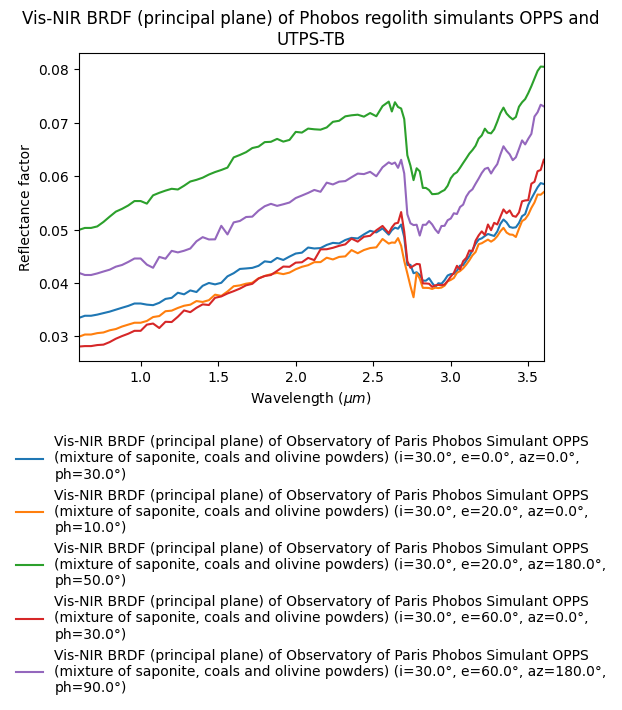- DOI
- 10.26302/SSHADE/EXPERIMENT_OP_20240717_002
- Data reference
- Wargnier, Antonin; Poch, Olivier; Beck, Pierre (2023): Vis-NIR BRDF (principal plane) of Phobos regolith simulants OPPS and UTPS-TB. SSHADE/GhoSST (OSUG Data Center). Dataset/Spectral Data. https://doi.org/10.26302/SSHADE/EXPERIMENT_OP_20240717_002
- Publications
- Database(s)
- Experimentalists
- Type(s)
- laboratory measurement
- Description
- Vis-NIR (0.6-3.6 µm) reflectance spectra (i=0-60°, az=0°, and phase angles from 5 to 130°) acquired with the SHADOWS instrument of mixtures of phyllosilicates, coals or carbon and other minerals used as a Phobos regolith simulant. Observatory of Paris Phobos Simulant OPPS (mixture of saponite, coals and olivine powders) and University of Tokyo Phobos Simulant, Tagish Lake based, UTPS-TB (powder mixture of serpentinite and other minerals)
- Number of spectra
- 2
- Variable type(s)
-
- illumination-observation geometry
- Comments
- Spectra were measured at different phase angles from 5° to 130°, in the scattering plane, also called the principal plane.
- Instrument
- SHADOWS Spectro-Gonio bidirectional reflection Vis-NIR
- Sample holder
- open rectangular sample holder (14 mm long, 7 mm wide, 1 mm deep) in anodized aluminum
- Standard medium
- air
- Observation mode
- spectrum
- Spectral range type(s)
- Vis, NIR
- Valid spectral range(s)
-
Min - Max (${\mu}m$) Sampling (${\mu}m$) Resolution (${\mu}m$) Position accuracy (${\mu}m$) Absorption edge #1 0.6 - 0.68 0.02 0.003 #2 0.7 - 1.58 0.02 0.006 #3 1.6 - 2.82 0.02 0.013 #4 2.84 - 3.6 0.02 0.026
Definition: incidence and emergence angles are positive with origin at nadir, and vary in same direction. Azimuth origin (increasing clockwise) is for i = e (opposition geometry).
- Observation geometry
- bidirectional
- Observation mode
- two variable angles
Illumination
Observation
- Comments
- partial polarization variable with wavelength (from monochromator grating)
- Observation mode
- single spot
- Image size
- 5.2 x 5.2 $mm$
- Date begin
- 2023-06-20
Versions
- Release date
- 2024-08-19 09:57:16+0000 UTC
- Version (Date)
- #2 (2024-08-19 09:57:16+0000 UTC, Updated: 2024-08-19 10:08:09+0000 UTC)
- Older version(s)
- Sponsors
-
- Centre National d’Etudes Spatiales (CNES) (Scientific support of the MIRS instrument onboard the MMX mission)
